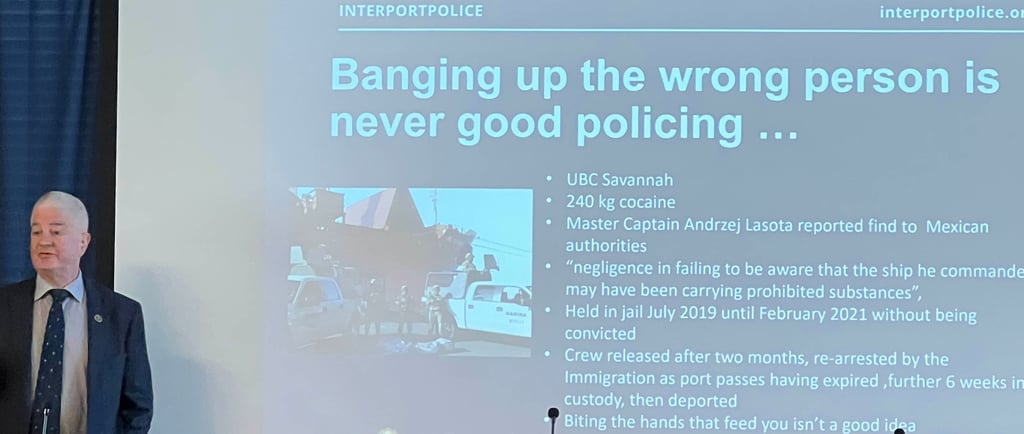Criminalization of seafarers in the context of drug trafficking on ships
International meeting of 60 representatives of government departments, shipping companies, ports, supporting services, military, law enforcement, and border control agencies addressing an increasingly critical issue.
1/22/20241 min read


On 9 January 2024, a “Symposium on Drug Smuggling in Ships: Fostering Law Enforcement/Trade Collaboration” was held at the U.S. Coast Guard Sector Houston-Galveston headquarters in Houston, Texas. The event was organized by BIMCO, InterManager, World Shipping Council, INTERPORTPOLICE, Northeast Maritime Institute and its Center for Ocean Policy and Economics (COPE), and hosted by the United States Coast Guard. The symposium was attended by over 60 representatives of government departments, shipping companies, ports, supporting services, military, law enforcement, and border control agencies.
The focus of the programme was to review the current situation with respect to the criminalization of seafarers in drug cases; to review current measures to prevent the smuggling of drugs, psychotropic substances, and precursor chemicals on ships engaged in international maritime traffic; and to identify key workstreams for improving the guidance available to governments, ship operators, seafarers, port operators and law enforcement and border control agencies going forward.
Specific references were made to the range of challenges, from basic understanding to the disconnect of authorities concerning operational requirements and responsibilities of the shipping companies and their officers and crews. Key discussion points and recommendations focused on:
The increase in trafficked drugs
The question of what should Administrations and ship operators do?
The process of exercising due diligence
How to address effective cooperation, coordination and communication
Learning from the many lessons learned from the aviation industry and
Moving forward:
The meeting assisted in pinpointing issues for the development of comprehensive and up-to-date guidelines for Government and industry on preventing drug trafficking on ships and to ensure there is an equitable treatment of officers and crew when unknowingly implicated in such activities,
Expand on the identified points and build practices lending to a comprehensive guide and
To assist the IMO’s Facilitation Committee to update the current IMO guidance (resolutions MSC.228 (82) and FAL.93 (34)).
For additional information, contact INTERPORTPOLICE’s IMO representative, Deputy Secretary Chris Trelawny, at: chris.trelawny@interportpolice.org
INTERPORTPOLICE (C) 2024 A Security Service Organization - Police, Security, Public Safety
Port authority security services worldwide for Over 50 years
Issues
Advisory
Policy/Resources
Questions - Contact Us
Secretary's Office


